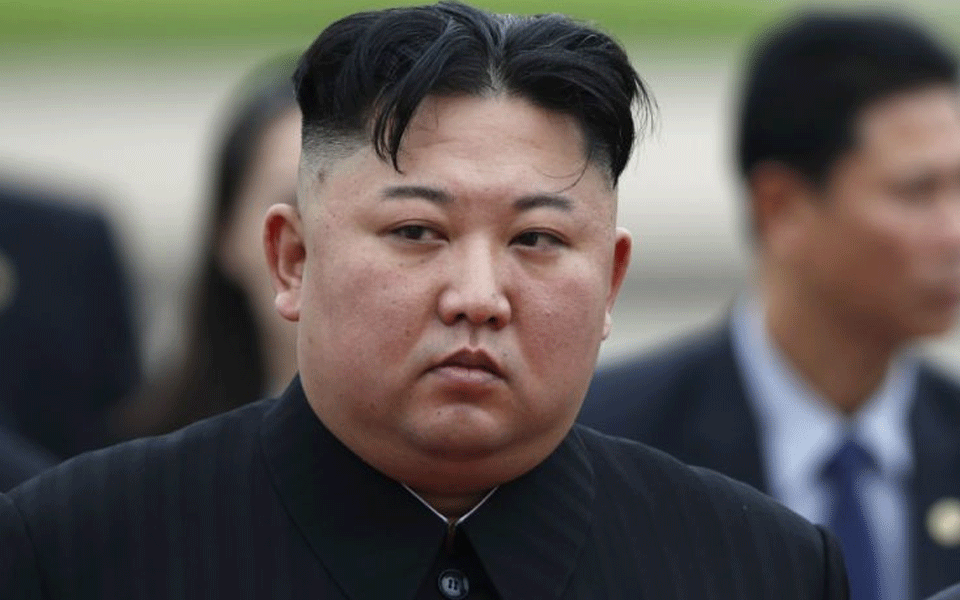Vladivostok: North Korean leader Kim Jong Un arrived in Russia's Pacific port city of Vladivostok on Wednesday for a first summit with Vladimir Putin, as Pyongyang seeks support in its nuclear deadlock with the United States.
The talks, organised in secret and announced at the last minute, will be Kim's first face-to-face meeting with another head of state since negotiations with US President Donald Trump in Hanoi collapsed in February.
Kim's armoured train arrived in the afternoon at the Tsarist-era train station in Vladivostok and he stepped out onto a red carpet before making his way outside to be received by an honour guard.
"I hope that this visit will be successful and useful," Kim told Russian television in the Russian town of Khasan where his train crossed the border.
"I hope that during the talks... I will be able to have concrete discussions on resolving situations on the Korean Peninsula and on the development of our bilateral relationship," Kim said.
Putin was due to arrive in Vladivostok on Thursday, then fly on after the talks for another summit in Beijing.
The North's official Korean Central News Agency (KCNA) earlier reported Kim's departure by train, naming among his entourage foreign minister Ri Yong Ho.
The train crossed the Tumen river Wednesday and arrived in Khasan, where women in folk costumes welcomed Kim with bread and salt in a traditional greeting.
Kim's predecessors as leader, his father and grandfather, also stopped there on their trips to neighbouring Russia.
At Khasan station a small wooden building known as the House of Kim Il Sung commemorates Russian-Korean friendship.
Russian and North Korean flags were already flying on lamp posts Tuesday on Vladivostok's Russky island, where the summit is expected to take place at a university campus.
Kim plans to stay on in Vladivostok on Friday for a series of cultural events, including a ballet and a visit to the city's aquarium, Russian media reported.
The talks follow repeated invitations from Putin since Kim embarked on his diplomatic overtures last year.
Since March 2018, the formerly reclusive North Korean leader has held four meetings with Chinese President Xi Jinping, three with the South's Moon Jae-in, two with Trump and one with Vietnam's president.
Analysts say he is now looking for wider international support in his standoff with Washington, while Moscow is keen to inject itself into another global flashpoint.
In Hanoi, the cash-strapped North demanded immediate relief from the sanctions imposed on it over its banned nuclear weapons and ballistic missile programmes, but the talks broke down in disagreement over what Pyongyang was prepared to give up in return.
North Korea last week launched a blistering attack on US Secretary of State Mike Pompeo, insisting he be removed from the negotiations just hours after announcing it had carried out a new weapons test.
Moscow has already called for the sanctions to be eased, while the US has accused it of trying to help Pyongyang evade some of the measures -- accusations Russia denies.
Kremlin foreign policy aide Yuri Ushakov told a briefing on Tuesday: "The focus will be on a political and diplomatic solution to the nuclear problem on the Korean Peninsula." "Russia intends to help consolidate positive trends in every way," he said, but added that no joint statement or signing of agreements was planned.
KCNA did not mention whether Kim's wife Ri Sol Ju or his sister and close aide Kim Yo Jong were accompanying him.
Moscow was a crucial backer of Pyongyang for decades and their ties go back to the founding of North Korea, when the Soviet Union installed Kim's grandfather Kim Il Sung as leader.
The Soviet Union reduced funding to the North as it began to seek reconciliation with Seoul in the 1980s, but Pyongyang was hit hard by its demise in 1991.
Soon after his first election as Russian president, Putin sought to normalise relations and met Kim Jong Il
The first of those meetings was in Pyongyang in 2000, when Putin became the first Russian leader to visit the North.
China has since cemented its role as the isolated North's most important ally, its largest trading partner and crucial fuel supplier, and analysts say Kim could be looking to balance Beijing's influence.
While ties between Russia and the North have remained cordial, the last meeting between their leaders came in 2011, when Kim Jong Il told then-president Dmitry Medvedev that he was prepared to renounce nuclear testing.
His son has since overseen by far the country's most powerful blast to date, and the launch of missiles capable of reaching the entire US mainland.
Let the Truth be known. If you read VB and like VB, please be a VB Supporter and Help us deliver the Truth to one and all.
Dubai: Smoke was seen rising from an area near the United States Consulate in Dubai, according to witness accounts cited by Reuters.
There was no immediate official confirmation on the extent of damage or whether there were any casualties in the incident.
Earlier, the US embassy in Riyadh, Saudi Arabia’s capital, was also attacked. Authorities reported damage to the premises, but no casualties were recorded.
The developments come amid heightened tensions in the region, with Iran continuing to target US interests in the Middle East following deadly attacks launched on Saturday by Israel and the United States.
Near US embassy in Dubai pic.twitter.com/z5VTZNVxNO
— Sahil Shah (@thesahilsshah) March 3, 2026





